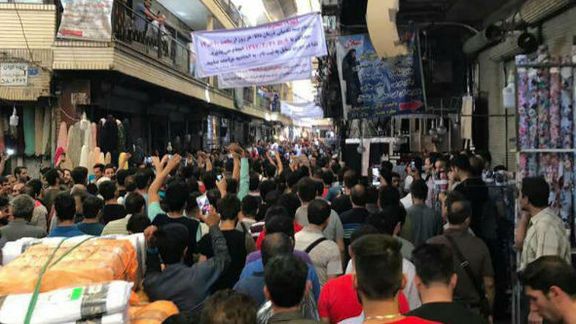Merchants Continue Strikes In Tehran And Other Iranian Cities

More shop owners and merchants in Iran’s capital Tehran as well as smaller cities Monday joined a strike that started on Sunday, protesting newly imposed taxes.

More shop owners and merchants in Iran’s capital Tehran as well as smaller cities Monday joined a strike that started on Sunday, protesting newly imposed taxes.
Meanwhile, pensioners have kept on their rallies and teachers are set to join a new round of nationwide protests.
On Monday, merchants in the city of Kazeroun in the southern province of Fars refused to open their shops joining a growing strike movement by merchants in the provincial capital Shiraz as well as Tehran and Arak who kept their shops and the bazaar closed for the second day in a row.
The protest by shop owners in Tehran also expanded when merchants in the old Lalehzar shopping district, a hub for businesses related to lights and electric devices, also kept their businesses closed on Monday, and held protest rallies against rising taxes and a falling national currency, as the rial hit an all-time low against the US dollar over the weekend.
Amid runaway inflation and economic chaos, one US dollar surpassed 333,000 rials on Sunday. This represents a more than 25-percent decline since late March and a 10-fold drop since 2017.
According to videos published on social media, security forces clashed with the protesters on the Lalehzar street, beating them and seizing their cellphones.
Earlier in the day, the spokesman of parliament's National Security and Foreign Policy Committee, Mahmoud Abbaszadeh-Meshkini, said the legislature is considering an amendment aimed at easing regulations for security forces and plainclothes agents to use firearms against illegal gatherings.
Although the Iranian constitution allows unarmed peaceful protests without insulting Islam, in practice no group or individual can get a permit for a gathering critical of government policies or officials. Pro-government rallies, on the other hand, are allowed to take place without interference.
Describing the new amendments as a well-calculated move, he said, "Over time, some acts of violence may emerge in our society, which is why it was so necessary to amend this law.”
Meshkini’s remarks were echoed Monday by Iran’s Chief Justice Gholam-Hossein Mohseni-Eje'i, who said, "Recently, there have been attacks on our police forces, which are not acceptable at all.”
Last week, the government handed a draft bill to parliament to ease the use of firearms by different security forces against civilians amid recurring protests.
On Sunday, protesting shop owners in various cities such as Esfahan and Shiraz chanted slogans against government corruption and mismanagement, threatening to intensify their protests, while criticism of the government's economic and foreign policies intensified in the media.
Bazaar or traditional retail market strikes have a deep historical root in Iran and signal a serious political and economic crisis. The bazaar strikes played a major role both in the Constitutional Revolution of the early 20th century and the 1979 revolution against the monarchy.
The Sunday strikes and protests took place on the backdrop of a series of demonstrations and marches since early May when the government scrapped a food import subsidy.
The Coordination Council of Iranian Teachers’ Trade Associations issued a statement recently announcing the next round of nationwide protests slated for Thursday, calling on teachers all over the country to take to streets and demand their legal rights.
Iran has experienced intermittent large and small protests since 2017, but the political situation has worsened in recent months, with a growing sense that social chaos and political insurrection might ensue.